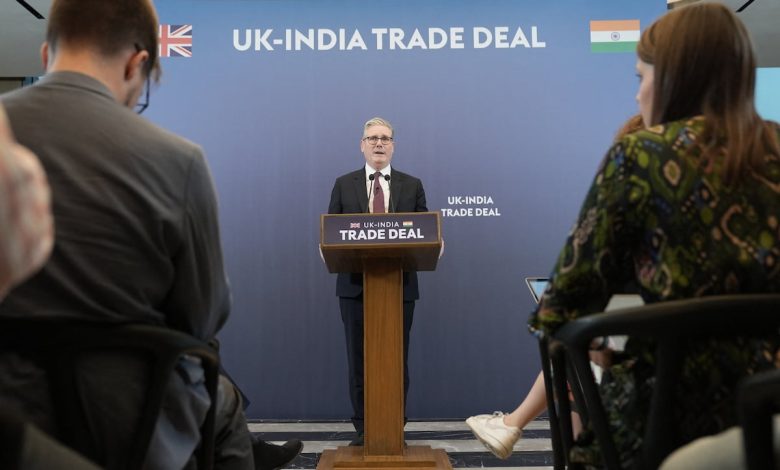India to buy UK-made Thales multirole missiles in £350 million deal

PARIS — India agreed to buy multi-role missiles manufactured by Thales in the United Kingdom in a deal worth £350 million ($468 million), the U.K. government said on Thursday.
The deal to deliver the Lightweight Multirole Missile to the Indian Army was signed during U.K. Prime Minister Keir Starmer’s two-day visit to Mumbai, paving the way for a broader partnership in complex weapons that the countries are negotiating, the British government said in a statement.
The missile deal “paves the way for a deeper relationship between U.K. and Indian defense industries,” U.K. Secretary of State for Defence John Healey said in a post on social media. “This is how we are making the U.K. defense industry an engine for growth.”
The U.K. has been eyeing a larger share of the Indian armament market, with a 2021 policy road map on U.K.-India relations including defense and security as one of its pillars. While India is the world’s second-largest importer of arms, the U.K. accounted for only just over 3% of India’s defense acquisitions over the past decade, according to a Chatham House report in July.
India and the U.K. also agreed to move forward on an industrial collaboration to develop electric propulsion for naval ships, in a deal worth an initial £250 million, the U.K. said. That follows the signing of a statement of intent between the defense ministries of both countries in November to develop electric propulsion systems for the Indian Navy.
While India is shifting away from Russia to Western suppliers, that has notably benefited France, the United States and Israel, the Stockholm International Peace Research Institute noted in a March report on arms transfers. New Delhi has preferred government-to-government deals over the U.K.’s more commercially-driven approach, Chatham House said.
India’s purchase of the Thales Lightweight Multirole Missile follows a contract in February between Thales and Bharat Dynamics to deliver a laser-guided, man-portable air-defense system to the Indian Ministry of Defence, with an initial supply of launchers and Starstreak high-velocity missiles to be delivered this year.
The LMM, also known as the Martlet, is a lightweight missile that shares some technology with Starstreak, and can be either air- or surface-launched against airborne or surface targets. Both missiles are manufactured by Thales at its site in Belfast, Northern Ireland.
Thales says the LMM weighs 13 kilograms with an operational range of more than 6 kilometers, traveling at more than 1.5 times the speed of sound. That compares to a speed of more than Mach 3 for Starstreak, which delivers a payload of three high-velocity darts.
The contract to deliver the LMM to the Indian Army will secure more than 700 jobs in Northern Ireland, according to the government.
The missiles and launchers are the same as those destined for Ukraine, according to the U.K., which placed an order worth as much as £1.6 billion with Thales in March to supply more than 5,000 LMMs to the embattled country.
Meanwhile, the U.K. said MBDA’s Sea Venom anti-ship missile achieved initial operating capability on the Royal Navy’s Wildcat helicopters during a deployment of a carrier strike group led by the Prince of Wales aircraft carrier in the Indo-Pacific region.
The helicopter-launched missile complements the existing Martlet missile system, with the Sea Venom missile having enough destructive power to take out large warships including corvettes and patrol vessels, according to the U.K. Ministry of Defence.
Rudy Ruitenberg is a Europe correspondent for Defense News. He started his career at Bloomberg News and has experience reporting on technology, commodity markets and politics.







